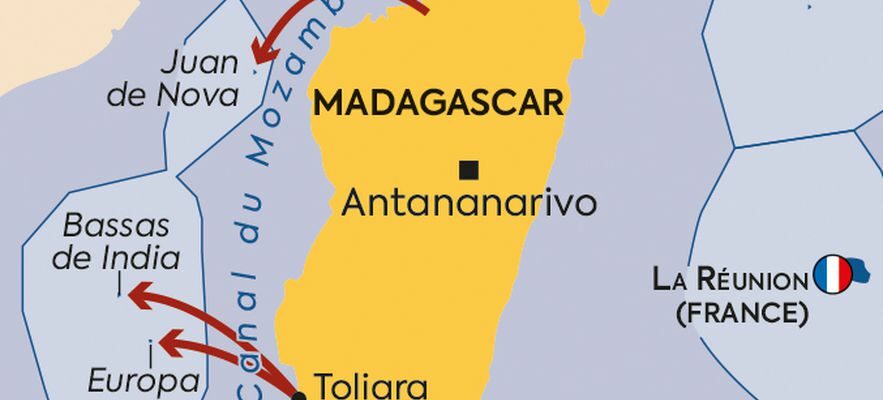In 2013, who could have imagined Daesh, the invasion of Ukraine, the assault on the Capitol? To deal with even the most surprising threats, the Ministry of the Armed Forces has asked the Chiefs of Staff, within the framework of the next military programming law, to detail the dangers hanging over our country. Clearly, to propose credible scenarios justifying the use of force. Independently, L’Express wanted to develop its own “black scenarios” in order to question the preparation, the possible flaws in the French defense, and thus fuel the necessary public debate on these questions at 60 billion euros per year. .
About forty experts – researchers, diplomats, generals, former executives of the DGSE – were asked to deliver their analyzes of the main threats that await France by 2030. Their framework was developed from a geopolitical tension real, to which we have integrated, on the suggestions of our great witnesses, Murphy’s law, himself an American soldier: “Anything that is likely to go wrong will go wrong.” Russia, China, cyber, jihadism… The majority of these hypotheses overlap with those on which the armies are working. These scenarios do not constitute forecasts. The military, considering the worst on principle, are the first to know: it is never certain. Especially if you prepare for it.
Episode 1 : 2026, Russian tanks enter Estonia and Lithuania: “The area is a weak point for NATO”
Scenario 2: Madagascar takes over the scattered islands
April 2027. Madagascar remains a poor country. Storms and droughts have had a calamitous effect on its agriculture. Hunger riots break out. “In the event that France does not provide the appropriate solution to the power in place to stop these riots, the anti-French feeling, already very present, would only worsen”, analyzes Lova Rajaoarinelina, associate researcher at the Foundation for strategic research and former adviser to the President of the National Assembly of Madagascar.
Since 1970, a territorial conflict has existed between Antananarivo and Paris: the African country claims the Scattered Islands, located on either side of its territory. These small islands and atolls, kept by France at the time of decolonization in 1960, open the right to 640,400 square kilometers of exclusive economic zone (EEZ), that is to say 6% of French maritime territory. In 2003, a study by the Norwegian company TGSNopec revealed huge hydrocarbon resources there.
Beijing’s financial protection
Cornered, the Malagasy power is approaching a new ally, present for twenty years: China. “It has developed a certain number of activities in Madagascar, which notably provide it with potential logistical support to gain a foothold in the Mozambique Channel and the Indian Ocean”, remarks Emmanuel Véron, specialist in contemporary China at the National Institute Eastern languages and civilizations. Becoming Madagascar’s leading supplier, Beijing had the deep-water port of Narindra built in 2025, in the northwest of the country.
“In exchange for its financial aid, Madagascar could very well allow China to circulate in its territorial waters”, continues Lova Rajaoarinelina. A framework cooperation agreement between the two countries was then signed, similar to that which the Chinese power initialed, in 2022, with the Solomon Islands, an archipelago located 1,500 kilometers northeast of Australia. Like its predecessor, the document provides that, “as needed”, Antananarivo may ask China to send police and military “to protect people and their property, or provide any other form of assistance”.
In 2028, Madagascar takes over the Scattered Islands
© / Map legends
A strange ballet takes place: the Chinese boats sail near French territorial waters, without Paris reacting. Then they rape them. “Beijing would remain in a hybrid conflict of harassment and intimidation, to stay below the threshold of high intensity”, advances Emmanuel Véron. A so-called “reckless pedestrian” strategy, analyzes Colonel Michel Goya, which consists of pretending to have made a mistake in good faith. In reality, it is a question of testing the reaction of the adversary. France sends a frigate to disaster. The Chinese ships appear to be in retreat, but they become more aggressive as the months go by. French warning shots take place on several occasions.
Death by 100,000 cuts
Xi Jinping, the Chinese president, then claims to support Malagasy sovereignty claims. He declares that French fire would constitute a hostile act entailing heavy repercussions. Didn’t a 1979 UN resolution recognize the legitimacy of Madagascar’s demands? French opinion is split between those who see it as the disastrous symbol of a downgrading and those who support a process of Malagasy “decolonization”.
Concentrated on other operations, France accommodates itself to sharing its EEZ with Chinese and Malagasy boats. She agrees to relaunch discussions with Antananarivo on the status of the islands, which have been on hold since 2020. China’s undermining work is starting to pay off. Little by little, the Chinese and Malagasy buildings end up dangerously encircling the Scattered Islands. “China would opt for a strategy that takes time, imagines Guillaume Lasconjarias, associate professor at Paris-Sorbonne and former researcher at NATO’s defense college. We test the adversary until there is no no need to do it anymore, since the whole thing has been captured. It’s death by 100,000 cuts”.
In early August 2028, a Malagasy patrol boat, assisted by a Chinese frigate, landed on the Glorious Islands. Fourteen legionnaires and a French gendarme are arrested and escorted to Mayotte. A humiliation. Already, China is eyeing another part of the world, also rich in resources: in 2027, it completed the construction of a military base in Vanuatu, in the Pacific. In addition to supporting New Caledonia’s independence through influence operations, in the name of decolonization, Beijing supports Vanuatu’s claims to Hunter and Matthew, two Caledonian islets. Objective, take advantage of the territorial waters of the micro-state, and make it essential to make the best use of the Caledonian nickel industry, which represents 12% of world production.
